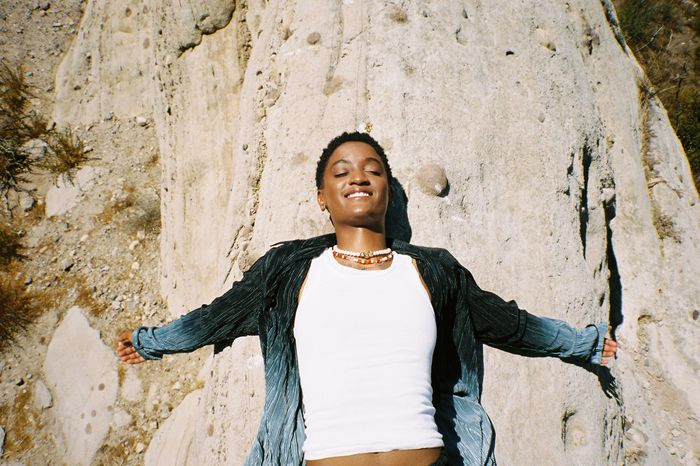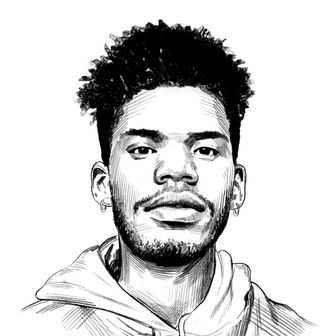
At the turn of the 2010s, when Syd Bennett — then Syd the Kid — co-founded the R&B crew the Internet and was the only Black woman in Odd Future, it was common to believe she embodied a certain kind of danger. Her music and mystique as a buttery-smooth femme seductress left more than a few fellas shook in the crowd. The assumption was that even if Syd wouldn’t take your girl, her sultry lyricism — present in her music with the Internet then magnified in her debut solo album, 2017’s Fin — might make one peek over the ever thinning sexuality fence just to see how the other girls were living.
Of course, the joke that Syd would swipe your partner from right under your draping arm was based in a kind of interpersonal — and at times queerphobic — alarmism that spoke to how convincingly cool the L.A. artist could be, even if her songwriting in the early ’10s was largely based in drugged-out one-night stands and a multitude of propulsive but altogether futile affairs. It stayed that way through Ego Death, the Internet’s Grammy-nominated 2015 album, when the group’s sound became less about appealing to Odd Future’s musical sensibility — the dark swampy 808s and madhouse shock and awe — and more aligned with the jazz-funk blend that convinced radio heads to gorge on their sound.
Syd’s new album, Broken Hearts Club, signals a different approach, with the 29-year-old singer and producer shedding the hedonistic visions of her earlier work and turning her attention to a steadier romanticism. Nowhere across its running time is she even gandering at other lovers, the wry smirk she might flash at a show years ago traded for a deep sigh over a loving relationship. BHC is an album Syd composed, in her own words, “when I was in love. You’re really getting the whole journey from the beginning to the end.” It’s constructed like a song cycle in the same vein as Kississippi’s Mood Ring, which takes a similar approach to its narrative sonics. But where Kississippi reused and remixed chord progressions to celebrate and memorialize a relationship that sounds as if it could’ve occurred all in one room, Syd’s rendition feels a bit more naturally scattered. Her ears bend toward a Cali Vice psychedelia that could either cajole tears on the dance floor (“CYBAH”) or soundtrack a long drive with the top down, steering wheel in one hand and your lover’s thigh meat clutched in the other (“Fast Car”).
It seems as if the breezy nature of BHC removes a bit of Syd’s edge. And indeed, her longtime fans might miss that feeling of being scooped up by the low-hum slick talk of one of the smoothest operators in music. The lovey-dovey simpian side of Syd has always been present (it’s all over Ego Death), but in BHC, her moves toward monogamy can be jarring, as with the puppy-love dramatics of “Tie the Knot,” which posits her as a little hesitant but altogether with the whole long-term relationship thing. Beyond the lyrical themes, Syd’s songwriting has never been more emotionally flexible. When she croons “Ask me how I know that this is love” over divine synths on “Sweet,” she doesn’t even let us conjure an answer. Instead, she reflects her previous self (“No more playin’, no more clubbin’, no more frontin’, babe”) and what a deep connection with one person calls for her to leave behind. The song’s bubblegum interlude makes way for the Darkchild-produced, Aaliyah-esque turn on “Control,” where she almost gives off sub energy — not all the way, but it’s damn close — deciding to totally relinquish herself to the whims of her lover with the term frontin’ returning to the fore (“She gives me somethin’ I can’t even front about.”). It’s in these moments that things begin to turn.
Midway through, BHC intones the feel of its title. Dark, droning drums catalyze the chopped-and-screwed fashion of “No Way.” Love endears us to the shadows of a person, what they carry with them in both articulable and unspoken ways. The second half of the album is about seeing signs and taking those feelings seriously. “Out Loud,” an acoustic ballad featuring Kehlani’s gorgeous inflection, is a devastating interrogation of reciprocity that breaks the dam on a relationship that might not actually be redeemable: “Don’t understand / Why you haven’t told your friends.” From that point, the understanding of the relationship’s failure cascades from surface-level recognition to exasperation to a realization that Syd wants and deserves more. She torrents through “Heartfelt Freestyle,” rap-singing, “Is this for sure? / Or is this for show?” By the time we get to the sayonaras in “Goodbye My Love,” Syd is attempting to regain control not of her lover but of herself: “I suppose this is good-bye, my love … We had to put ourselves first for once.” It’s not the first time Syd has shown a return to self. Fin was a pat on the back for personal and professional development; “Nothin to Somethin” and “All About Me” were some of her loudest “Look at us: We made it” bars ever. Songs ranged from titillation (“Body”) to cursory emotional excavation (“Insecurities”). It wasn’t until her 2017 EP, Always Never Home, that she pointed to a more somber groove — “Moving Mountains,” for example, was her first song in which she questioned all she was giving to a partner while that person had her “out here lookin’ crazy” — and audiences got a taste of Syd’s disappointment around love. Still, those records carried a protective braggadocio that centered on who Syd was as a figure. That is not to say that the courting, connection, and relationships she’s had with lovers were necessarily masturbatory, but more that she acted on desires she knew she had even if they were ephemeral and possibly hurtful.
But there is a deeper resonance in putting oneself first. The fact that Syd would write and release a record about all the peaks and valleys of being a lover underscores her desire to process loss. As she sings on “BMHWDY” (or “Break My Heart Why Don’t You”), “Tell me how it feels / Given that before.” But there is nothing to prepare us for loss unless we internalize that the possibility is always present and inevitable. That ominous sense that she is thrillingly astro-planing toward an inevitable end is what gives Syd’s lyrical storytelling so much heft. We know this will go left, but just how much will be lost, and will she be able to appreciate all she’s gained? That’s the quiet brilliance of BHC. We’re along for the ride to a place of no return. “You gave me a version / It wasn’t perfect / But now it’s nothing,” she sings on “Missing Out.” But we know that isn’t true. The love can’t be nothing.
A broken heart might not seem functional, but it’s still useful, even if it is a hieroglyph that requires a specific key to understand. BHC as a concept album provided Syd just enough focus to get real about her loss through the lens of an overwhelming relationship. We’ve almost never heard her take an L, and the result is a Syd who feels much more tangible. But she doesn’t sound any weaker for it. By the end, there lies an even deeper self-respect. To have lived through an encompassing albeit unbecoming love and have survived it with all the parts of herself intact feels like a triumph. She’s never told that story. This is the most intimate Syd has ever been, and while I’m not sure we understand her heart any more than we did before, her ability to convey that confusion — its exuberance and its hesitance in equal parts — makes BHC an achievement all its own.


